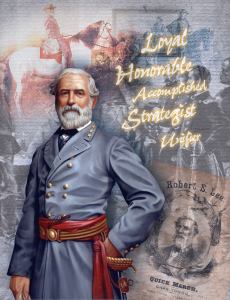“I will follow my native state with my sword and, if need be, with my life.”
DID YOU KNOW…
- Robert E. Lee came from a military background. His father, Henry Lee, widely known as Light-Horse Harry, served as a cavalry leader during the American Revolution, and eventually as Virginia’s governor. But he didn’t know how to handle money, so Robert E. Lee enjoyed no financial advantages. His father died while Robert was a child, leaving his financially pinched widow alone to raise seven children.
- Lee was married to distant cousin Mary Anna Randolph Custis, who also was a great-granddaughter of Martha Washington from her first marriage, and great-stepdaughter of President George Washington.
- As a Confederate soldier, Lee relinquished his American citizenship. Because of a filing snafu, he never lived to see it restored. After requesting to be reinstated, Lee took a lack of response to mean that the president wanted to retain the right to prosecute. His request was not granted until 1975, after a five-year campaign to have it done posthumously. But Lee’s request still held significance in his day: It encouraged other former Confederates to rejoin the United States.
It makes perfect sense that Robert E. Lee holds a place of such high esteem for Dick Covert.
First, there’s the obvious: Both men are of the South, and Covert also happens to be a Civil War buff.
“I love American history, from the country’s founding up through the Civil War,” says Covert, executive director of the Master Pools Guild based in Richmond, Va.
But Covert’s admiration for the Confederate general goes well beyond history. Lee was a deeply loyal man, a quality that Covert holds as one of his own guiding principles.
In 1861, a few days after the first shots of the Civil War were fired, President Abraham Lincoln summoned Lee to Washington. Once there, he was asked to lead the entire Union Army.
The request put Lee in a terrible position. On one hand, he was a highly patriotic military hero who denounced secession as a betrayal of the nation’s founders. He was also well aware that the North held every advantage for winning the war.
On the other hand, Lee’s beloved state of Virginia had seceded just the day before.
In the end, loyalty to his home won out. In a letter to his sister two days later he wrote, “With all my devotion to the Union … and duty of an American citizen, I have not been able to make up my mind to raise my hand against my relatives, my children, my home.”
Lee eventually became the most prominent general in the Confederate Army and senior military adviser to Confederate President Jefferson Davis.
“He chose his faith and his belief in his home over the glory that he would have had leading the North,” Covert says. “His whole decision was, ‘This is my home, this is my family, this is where I belong.’”
Lee could see the opposing sides in a way that few probably did. “He had a lot of classmates at West Point who were on both sides of the war,” Covert explains. And even though his home was technically in Virginia, it was just outside Washington, D.C., in the mansion that now sits at Arlington National Cemetery.
Today, it’s hard to think about the Civil War without considering the horror of slavery. But like many Southerners, Covert doesn’t see the Confederacy as necessarily defending slavery. Rather, he looks at the issue as being about states’ rights.
Over the next few years, the Confederate Army performed amazingly well, given the South’s lack of resources. But it wasn’t enough. Once it was clear how the war was going to end, Lee acted quickly to ensure that no more lives were wasted.
“He wanted to make sure that his men were taken care of, all the way to the end,” Covert says. “When the war was reaching its conclusion, he left Richmond to keep it from being destroyed … and when he surrendered, it was a gentleman’s surrender.”
Lee lost everything, whereas his Union counterpart served as president five years later. But the Confederate leader never seemed to begrudge what he had given up.
“He accepted his decision,” Covert says. “He accepted his fate, and he then set out to live the rest of his life in the way that he had lived the first part — as a leader, as a gentleman, as a man of principle.”


